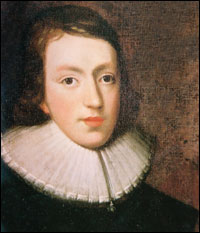The World of Arts
The Saga of John Miltonís Paradise Lost
Gwen Herat
Astonishingly transferred thoughts and dreams to letters .... to
words. His deep maturity reflected the dimentions of human morality. For
a poet as young as he was, he wrote some of his best poems at an early
age. John Milton did not embody the romantic spirit of man, rather his
emotional intensity with his creator. A sort-of a philosopher, he
carried deep meaning beyond his words.
Milton was an episode with intellectuality though his poems were not
vibrant nor romantic because he used simple language to be read by
simple people with spiritual leaning. The signature of his greatness was
in-depth feeling he aroused in the reader who at first would read and
forget its text. But Milton went beyond imagination. He stirred
feelings; he made them pause and he made them digest his words.
|

John Milton |
I would compare Miltonís work with a Michaelangeloís mural. The more
you gaze at it, the more the painting reveals its beauty and character.
There is a rich ripeness with a blend of sensuous imagery in some of his
writings like for instance, what would Michaelangeleís brush had on
canvas.
Milton created a celestial revolution in Paradise Lost. He stamped
his Miltonic fragrance that spellbound the literary world. Paradise Lost
contains 12 books within its fold, followed by Paradise Regained with 4
books. What was written in numerous trilogical pattern, were the fervent
homage to his creater. The emotion with which Milton wrote these gems
keep sparkling lustrously over the years. They even surpass
Shakespeareís Venus and Adonis in emotion as well as in creativity.
Milton was a young scholar and poet who wrote with grace and facility
in Latin, Italian and English. His fair completion and delicately
moulded features, earned him admiration and was dubbed as the Lady of
Christís at Cambridge when he was only sixteen years old. He was
pampered by his father while his friends adored him. He was allowed to
further his studies without taking on a profession and was funded on a
Grand Tour for him to visit Rome, Florence, Naples and Venice. The
thirty year old John Milton at that time was a Protestent. It was a
surprise to all the time being the period of High Renaissance.
He was only twenty one when he wrote his palpable poem, on the
morning of christís nativity. He exhibited his thirst for literature
from the time he was thirteen. In the Nativity he created a different
persspect on the birth of Christ. He highlighted the incarnation, God
made flesh which is the cosmic event he celebrates to reveal truth on
the shadowed pagan world. Smitten by the birth and death of our Lord,
Milton proceeds with ideas that he unwittingly inculcate into verse.
As his eyesight failed in 1652 by which time he had risen to be the
monumental figure of the blind but powerful Puritan who wrote the only
English epic, Paradise Lost trailed by Paradise Regained. He had
overshadowed the brilliant young intellectual of the early years. Milton
indulged in passion for strange sonorous names that we find in Paradise
Lost along with pagan prophets of Syria, Egypt and ancient Greece.
This was before the truth of Christanity. However, we find Milton
caught up in his own web of reasoning, of sobselety of Ptolemaic
cosmology. He has placed earth in the centre of the universe. (to be
honest, I do not understand his logic)
Paradise Lost is the greatest epic poem written by an Englishman and
records his own evolution and manís disobedience to God and thereupon of
Paradise. Milton wanders away on its prime purpose but hastens to
illustrate the prime cause of manís fall. Satan with his Angels, now in
hell. He talks of regained Heaven, of a new world and a new kind of
creature to be created, to find out the truth of the prophecy. He paints
an awesome picture of pandemonium, the rising of a Satanís palace where
infernal peers sit in council.
As a Christian, the flaws and rigidity of twisted truth with which
Milton paints Paradise, is atrocious. No good Christian will bite his
truth about the creator and the insanity with which the cherubic,
angel-like Milton construed in his twisted mund. Rushdi with his Satanic
Verses can be the modern incarnation of John Milton, the poet I adore
minus the Paradise Lost.
John Milton (1608-74) is best remembered for his Paradise Lost.
(1667-1674). He was poet and polemicist and marked the apogee of his
religious and political life and convictions. Later he was involved in
the political liberty espoused by the Parliamentarian Party during the
Civil War. Miltonís last period of his life was of great unhappiness
during which period his young wife abandoned him when his eyesight was
failing. He died in 1674 and is buried at St. Giles, Copplegate in
London.
ĎOf manís first disobedience, and the fruit
of the forbidden tree, whose mortal taste
Brought death into the World and all our woe
With loss of Eden, till one greater Man
Restore us and regain the blissful seat
Sing, Heavenly Muse, that on the secret top,
Of Oreb, or of Sinai, didíst inspire
That Sheperd who first taught the chosen seed.....
Book 1 (lines 1-8) Paradise Lost |



